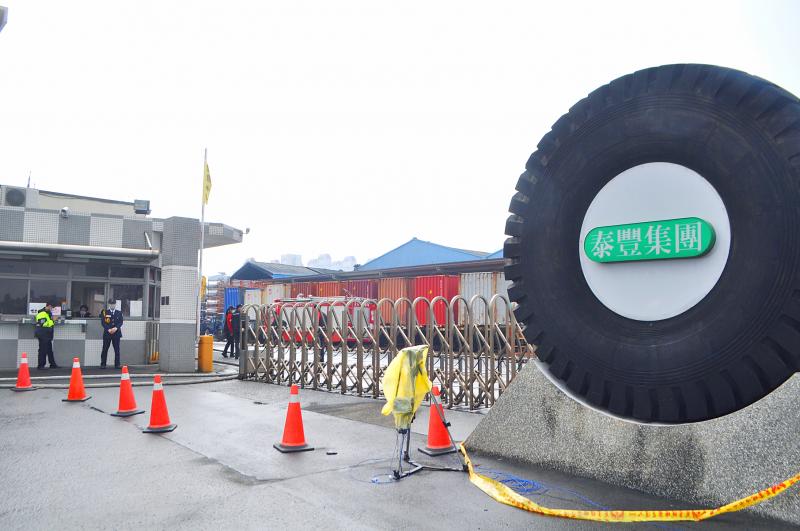Automobile and truck tire maker Federal Corp (泰豐輪胎) yesterday said that it has shut a factory in Taoyuan’s Jhongli District (中壢), as it has lost substantial orders following a steep anti-dumping tariff imposed by the US.
Federal Corp’s decision came after the US Department of Commerce on May 24 ruled that Taiwanese tire manufacturers have to pay anti-dumping tariffs of 20.04 to 101.84 percent.
Federal Corp faces a duty of 84.75 percent on tire exports to the US, up from a 4 percent levy on local suppliers in the past.

Photo: CNA
Cheng Shin Rubber Industry Co (正新輪胎) has tariffs of 20.04 percent and Nankang Rubber Tire Corp (南港輪胎) faces the stiffest penalty of 101.84 percent, the department has said.
“The anti-dumping duty has severely affected the company’s operations. Considering the levy’s threat to the company’s survival, the board of directors approved the proposal to close down the Jhongli plant entirely to safeguard shareholders’ interests,” Federal Corp said in a statement submitted to the Taiwan Stock Exchange.
Federal Corp expects the ruling to have a severe effect on its US orders and revenue, as more than 80 percent of the tires made at the factory are exported to the US, the statement said.
The Jhongli plant contributed about 27 percent to the company’s revenue of NT$549 million (US$19.85 million) in the first quarter, Federal Corp said.
The plant has installed capacity of 1.8 million tires a year, it said.
To cut costs and squeeze out more cash, Federal Corp has submitted an application to lay off a lot of workers, the company said.
It also plans to auction the Jhongli facilities and land, it said.
It has laid out a long-term business strategy to recoup lost exports to the US, while stepping up collaboration with overseas original electronics manufacturers to circumvent the duty, it said.

MULTIFACETED: A task force has analyzed possible scenarios and created responses to assist domestic industries in dealing with US tariffs, the economics minister said The Executive Yuan is tomorrow to announce countermeasures to US President Donald Trump’s planned reciprocal tariffs, although the details of the plan would not be made public until Monday next week, Minister of Economic Affairs J.W. Kuo (郭智輝) said yesterday. The Cabinet established an economic and trade task force in November last year to deal with US trade and tariff related issues, Kuo told reporters outside the legislature in Taipei. The task force has been analyzing and evaluating all kinds of scenarios to identify suitable responses and determine how best to assist domestic industries in managing the effects of Trump’s tariffs, he

TIGHT-LIPPED: UMC said it had no merger plans at the moment, after Nikkei Asia reported that the firm and GlobalFoundries were considering restarting merger talks United Microelectronics Corp (UMC, 聯電), the world’s No. 4 contract chipmaker, yesterday launched a new US$5 billion 12-inch chip factory in Singapore as part of its latest effort to diversify its manufacturing footprint amid growing geopolitical risks. The new factory, adjacent to UMC’s existing Singapore fab in the Pasir Res Wafer Fab Park, is scheduled to enter volume production next year, utilizing mature 22-nanometer and 28-nanometer process technologies, UMC said in a statement. The company plans to invest US$5 billion during the first phase of the new fab, which would have an installed capacity of 30,000 12-inch wafers per month, it said. The

Taiwan’s official purchasing managers’ index (PMI) last month rose 0.2 percentage points to 54.2, in a second consecutive month of expansion, thanks to front-loading demand intended to avoid potential US tariff hikes, the Chung-Hua Institution for Economic Research (CIER, 中華經濟研究院) said yesterday. While short-term demand appeared robust, uncertainties rose due to US President Donald Trump’s unpredictable trade policy, CIER president Lien Hsien-ming (連賢明) told a news conference in Taipei. Taiwan’s economy this year would be characterized by high-level fluctuations and the volatility would be wilder than most expect, Lien said Demand for electronics, particularly semiconductors, continues to benefit from US technology giants’ effort

‘SWASTICAR’: Tesla CEO Elon Musk’s close association with Donald Trump has prompted opponents to brand him a ‘Nazi’ and resulted in a dramatic drop in sales Demonstrators descended on Tesla Inc dealerships across the US, and in Europe and Canada on Saturday to protest company chief Elon Musk, who has amassed extraordinary power as a top adviser to US President Donald Trump. Waving signs with messages such as “Musk is stealing our money” and “Reclaim our country,” the protests largely took place peacefully following fiery episodes of vandalism on Tesla vehicles, dealerships and other facilities in recent weeks that US officials have denounced as terrorism. Hundreds rallied on Saturday outside the Tesla dealership in Manhattan. Some blasted Musk, the world’s richest man, while others demanded the shuttering of his